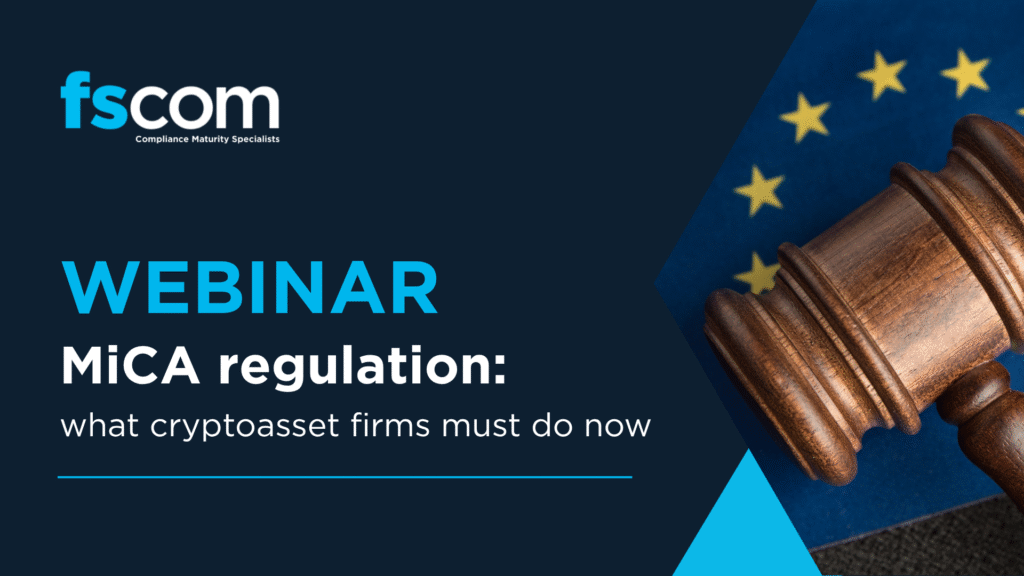The EU’s Markets in Cryptoassets Regulation (MiCA) has now become a cornerstone of digital finance regulation across the European Economic Area (EEA). Fully applicable since 30 December 2024, MiCA introduces a harmonised framework for cryptoasset activities, including the issuance, custody, and trading of tokens that previously fell outside the scope of existing EU financial legislation.
MiCA is directly relevant to cryptoasset service providers (CASPs), as well as issuers of cryptoassets, including asset referenced tokens (ARTs) and e-money tokens (EMTs). The core provisions have been applicable since the end of 2024, with transitional periods, varying by member states, with some until 1 July 2026.
Insights from the fscom MiCA webinar
On 22 October 2025, fscom experts Evan McGookin and Robbie Cullen hosted a dedicated webinar exploring what MiCA means in practice for crypto firms operating across Europe. They examined how firms are adapting to the regulation, the key challenges in achieving compliance, and what is still to come as supervisory expectations evolve into 2026.
From authorisation requirements to the interaction between MiCA and the Transfer of Funds Regulation, Evan and Robbie shared practical advice on how CASPs and token issuers can prepare for the next stage of implementation.

The core question
What do cryptoasset firms need to do now to comply with MiCA, and how can they navigate the evolving regulatory expectations through 2025 and beyond?
MiCA: Key provisions and responsibilities
MiCA introduces wide-ranging compliance requirements for different categories of actors. fscom has provided a comprehensive summary sheet of what this means for CASPs, ARTs, EMTs, and offerors and traders of other cryptoassets, downloadable here.
Publications in 202: Regulatory technical standards
In addition to these core provisions, the EBA and ESMA have developed a number of new Level 2 and Level 3 measures, including Regulatory Technical Standards (RTS) and Implementing Technical Standards (ITS), that have been published in 2025. These provide clarifying expectations on provisions, including:
- complaint handling procedures (RTS 2025/293, 294);
- business continuity and ICT resilience (RTS 2025/299, aligned with DORA);
- white paper approval processes (RTS 2025/296);
- transactional reporting for ARTs and EMTs (RTS 2025/298); and
- supervisory cooperation and third-country coordination (RTS 2025/297, 292).
Transitional period: Mind the gaps
MiCA’s transitional provisions allow CASPs authorised under national regimes before 30 December 2024 to continue operating until 1 July 2026, or until authorisation is granted or refused, whichever comes first. However, member sStates have discretion to shorten or opt out of this transitional, or “grandfathering” period, resulting in varying deadlines across the EU.
Some EU member states have opted for a shorter transition period, 6 months in the case of the Netherlands, Latvia, Hungary, Slovenia, and Finland, meaning that the transition period has already closed in these cases.
Sweden’s deadline of 30 September 2025 has also recently passed; however, other EU member states have opted for the maximum available transitional period up to 1 July 2026 (in some cases, with deadlines in place for applicant CASPs to benefit from the ‘grandfathering’ period).
See below for a further list of grandfathering periods decided by member states under MiCA:
Transitional period | Countries (EU & EEA) |
6 months (until 30 June 2025) | Latvia, Hungary, Netherlands, Slovenia, Finland |
9 months (until 30 September 2025) | Sweden |
12 months (until 31 December 2025) | Germany, Ireland, Greece, Spain, Lithuania, Austria, Slovakia, Liechtenstein, Norway |
18 months (until 1 July 2026) | Bulgaria*, Czechia**, Denmark ***, Estonia, France, Croatia, Italy****, Cyprus, Luxembourg, Malta, Romania, Iceland, Poland |
To be announced | Belgium, Portugal |
* To be able to benefit from the grandfathering period, applicant CASPs must have applied before 8 October 2025.
** To be able to benefit from the grandfathering period, applicant CASPs must have applied before 31 July 2025.
*** To be able to benefit from the grandfathering period, applicant CASPs must have applied before 30 December 2024.
**** Entities registered as VASPs in the Italian AML/TF register, or entities belonging to the same group, must file their application for MiCA authorisation by 30 December 2025 to benefit from the grandfathering period.
Key risk:
If your firm is passporting from a country with a longer transitional period into a country with a shorter one, you may be caught in a gap where authorisation is required but not yet obtained, resulting in operational disruption.
Consider:
- Early application for MiCA authorisation, even if you are in a jurisdiction with longer transitional periods;
- Monitoring national transitional rules; and
- Reviewing exposure to non-compliant tokens and adjusting offerings accordingly.
Without MiCA authorisation, CASPs cannot use EU-wide passporting rights during the transitional period, increasing pressure to act promptly.
Transfer of funds regulation: The Travel Rule challenge
MiCA does not operate in isolation. Since 30 December 2024, crypto firms must also comply with Regulation (EU) 2023/1113, aligning with FATF’s Travel Rule. This includes:
- verifying and transmitting sender/recipient data;
- real-time screening and blocking capabilities;
- ensuring interoperability with other CASPs; and
- managing cross-border compliance challenges.
2025 is the year of enforcement
With MiCA’s core rules now in force and supervisory reviews underway, 2025 is a critical year for crypto firms to demonstrate compliance maturity. National regulators are conducting spot checks and investigations, and the window for transitional adjustment is fast closing.
How fscom can help
fscom Compliance Maturity SpecialistsTM provide regulatory compliance solutions to financial services firms across the UK and Europe. With expertise in payments, asset management, capital markets, banking, and crypto, fscom helps firms benchmark compliance against regulatory requirements and industry peers, giving them a clear understanding of where they stand and how to reach their goals. Our mission is simple: to help firms raise compliance standards so together, we can protect people, prevent financial crime, and create a safer society.
Get in touch today to discuss your compliance needs or book a consultation with one of our crypto regulation experts.
This post contains a general summary of advice and is not a complete or definitive statement of the law. Specific advice should be obtained where appropriate.



